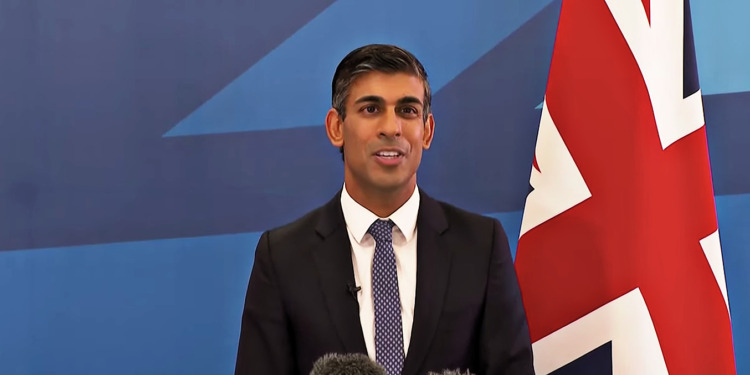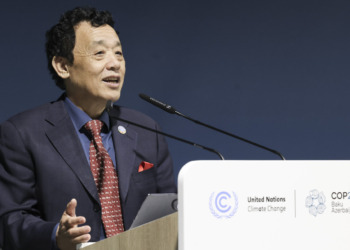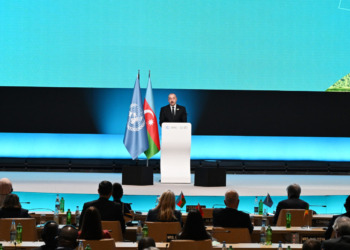With Liz Truss’ premiership over after 44 days, the UK’s Conservative party has named Rishi Sunak as her successor. The question for environmentalists is: How likely is the next prime minister of the UK to dismantle Liz Truss’ so-called “attack on nature”?
The mini-budget, which caused the British Pound to lose 3.6% value in one day, will probably be remembered as the most disastrous event of her short tenure. However, her government also proposed and passed multiple bills that environmentalists have called an “attack on nature.”
Here are the key issues upon which Sunak will need to focus in order to keep Britain on track to curb the effects of the climate crisis and preserve its natural resources.
How will the UK manage its environment in the absence of EU directives?
In her leadership campaign, Liz Truss had set out multiple policy initiatives that she wished to take as prime minister, one of which was to “to unleash the full potential of Britain post-Brexit, and accelerate plans to get EU law off our statute books.”
Truss promised to set a “sunset” deadline for EU-derived business regulation by the end of 2023. The bill to make this happen, called the Retained EU Law (Revocation and Reform) Bill (REUL), was introduced to parliament on Sep. 22 2022.
The REUL does not only revoke EU laws that are considered not suitable for the UK, it automatically revokes all EU-derived laws at the end of 2023 unless they are specifically extended, reinstated or replaced.
At the moment, there are 570 key laws which underpin all of the environmental regulation in the country. Every one of these bills are entirely based on EU directives and will expire by the end of 2023.
Please read and share our urgent open letter to @Jacob_Rees_Mogg – a great coalition of organisations all calling for the awful Retained EU Law Bill to be withdrawn … let's stop this #AttackOnNature pic.twitter.com/fCOhPHX3a8
— RSPB England 🌍 (@RSPBEngland) October 20, 2022
As a result, UK wildlife groups have dubbed the REUL “Liz Truss’ attack on nature”, because the outcome would be a total absence of any environmental regulation in England, if these laws are not rewritten before they are “sunsetted”.
Regulatory powers over the environment have been devolved in Scotland, Wales, and Northern Ireland, which means that the parliaments in these nations have control over how they legislate issues relating to the environment.
Before Brexit, this devolution of powers did not result in any significantly different policy between the separate nations, because the whole of the UK was bound to abide by EU regulations. If REUL were to pass parliament as introduced, the devolved nations would also have to rewrite many laws which, until now, were standardised throughout the UK.
In a letter to the UK Secretary of State for Business, Energy and Industrial Strategy, the Scottish Cabinet Secretary for Constitution, External Affairs and Culture said:
“I am alarmed that our environmentally-principled approach of controls on polluting substances, ensuring standards for water and air quality, and providing protection for our natural habitats and wildlife are at risk from this deregulatory programme.”
The introduction of this bill has also caused mass public outcry. Those concerned include environmental activists but also anyone who benefits from worker’s rights or allergy labelling laws in the UK, both of which originate in statutes derived from EU directives.
If the UK wants to take full advantage of the supposed benefits of Brexit, the next prime minister will need to ensure that regulation protecting the environment is reestablished to serve the needs of both British communities and ecosystems.
Can the UK abandon fracking forever whilst continuing to pursue energy independence?
Liz Truss also lifted the UK’s ban on fracking, in one of the most controversial pieces of policy passed during her brief premiership.
In 2019, after a series of unusual tremors located near the UK’s only shale wells, the Conservative government under Boris Johnson suspended fracking.
After becoming prime minister, Liz Truss appointed Jacob Rees-Mogg, an MP who notoriously described fracking as an “interesting opportunity”, as the Secretary of State for Business, Energy and Industrial Strategy.
Rees-Mogg, before being appointed Energy Secretary, also cited the gas reserves in the North Sea as a possible source of energy security, saying:
“We need to be thinking about extracting every last cubic inch of gas from the North Sea because we want security of supply. 2050 is a long time off. We’re not trying to become net-zero tomorrow, and we are going to need fossil fuels in the interim, and we should use ours, that we have got available.”
Shortly after becoming prime minister, Truss reversed the ban on fracking that had been in place since 2019, despite warnings that the technology to reduce and predict earthquakes caused by fracking has not improved since the ban was instated.
Truss declared that this was done for the sake of energy security, by distancing the UK from “the global energy market and the actions of malign actors.”
This focus on fossil fuels as a source of energy security for the island is misdirected for a few reasons.
First, both the quantity and quality of the shale gas that can be extracted in the UK is considered too little to make any meaningful difference to the country’s energy dependence.
Secondly, although Liz Truss claims that gas produced by fracking could be part of the energy grid within six months, estimates from the shale gas industry’s lobby group indicate that it would take years for fracking to start producing gas in useful quantities.
Finally, although the UK does have access to fossil fuels, the country’s potential as a source of renewable wind and hydro energy is far greater than its potential as an exporter of oil and gas. Scotland is currently on track to become a net exporter of renewable energy, and England, with its comparable climate and capacity for infrastructure, could easily follow suit.
I voted against fracking in the Commons tonight. During that vote I saw things I’ve never seen, like the Deputy Prime Minister, physically pick up an upset Tory MP & put him in the division lobby. Unbelievable scenes. Bullying like nothing I’ve seen in my 7 years as an MP. pic.twitter.com/j6YELj1OQZ
— Cat Smith MP (@CatSmithMP) October 19, 2022
Liz Truss’ government’s single-minded and short-term focus on fossil fuels, rather than reducing energy dependence, would simply allow the UK to continue complacently relying on nonrenewable resources.
Instead, the next prime minister needs to follow Europe’s lead and allow energy insecurity caused by the war in Ukraine to accelerate the UK’s transition to entirely renewable energy sources.
How can the UK ensure healthy habitats for its wildlife?
Liz Truss’ choice to prioritise a pipe dream of economic growth over the environment quickly inspired discontent from members of both her own party and the country’s largest environmental charities.
The regulations that require habitat assessment for a site to be completed before development can begin are also derived from EU directives, and as such, have been imperilled by REUL.
In addition to this blow to the UK’s wildlife, the mini-budget first presented by Truss and the former Chancellor of the Exchequer Kwasi Kwarteng included a proposition to create “investment zones” across the whole of the United Kingdom.
According to the UK government website:
“Investment Zones will be one or more specific sites within an MCA (Mayoral Combined Authority) or UTLA (Upper Tier Local Authority) where a variety of tax, regulatory innovations and flexibilities, and planning simplifications will apply within those site’s boundaries.”
The basic idea behind this plan is to incentivise residential and commercial growth in under-developed areas of the country by lowering taxes and reducing planning regulations.
However, this plan lacks definition in more ways than one. The plan does not include a cap on the number of possible investment zones or their locations, meaning that Areas of Outstanding Natural Beauty (AONBs), sites of special scientific interest (SSSIs), and green belt land are not exempt.
Related Articles: UK’s Net Zero Strategy Found Lacking in Court | Can Scotland Become A Leader in Renewable Energy? | UK Prime Minister Race Down to 4 Candidates: Who They Are and What They Stand for | Liz Truss Resigns as UK Prime Minister
Senior figures from the conservative party along with the National Trust, the Royal Society for the Protection of Birds, the Angling Trust, and Wildlife Trusts have all criticised the plan strongly, describing it as “environmental vandalism.” As a result, these groups and those that support them have been dubbed the “anti-growth coalition.”
This has sparked debate amongst politicians, economists, and environmental activists about whether an increase in GDP is possible without sacrificing the natural resources of the island.
Some activists claim that economic growth and the environment do not have to be mutually exclusive, and are in fact mutually dependent. Studies show that economic growth at the cost of the environment will harm the economy in the long run due to the expensive effects of climate change and land mismanagement.
Others say that, even if the environment and limitless economic growth cannot coexist, preservation of the environment is more important for the health of the country than any artificial growth represented by inflated GDP.
George Monbiot, a prominent environmental author and activist who advocates for radical change of land management in the UK, says of the “anti-growth coalition”:
“As a founder member of the anti-growth coalition, I’m delighted to discover how fast it has, ahem, been growing. We have sought to explain that what mainstream economists call progress is what ecologists call planetary ruin. We’ve contended that infinite growth on a finite planet is a recipe for catastrophe.
Richard Benwell, the chief executive of Wildlife and Countryside Link, said that the conditions set out for these investment zones demonstrate a complete lack of thought for any environmental protections and go directly against the government’s proposals to make any new development provide a “net gain” for nature.
The phrase “net gain” describes an approach to development that leaves the natural environment in a measurably better state than it was beforehand.
Benwell continued, saying:
“Sometimes, where precious nature is at risk, you simply have to say no. The false philosophy that everything can be traded or replaced would be seriously damaging for nature. If large swathes of the country were made investment zones where environmental planning rules were weakened, all the government’s hopes of reversing the decline of nature could be dashed.”
In the original mini-budget, Kwasi Kwarteng did not provide a costing for this program, and the Treasury is concerned that, without a cap on the number of these investment zones, it is impossible to predict how much money the tax breaks would cost the government.
Nonetheless, this program was allowed to stand despite Jeremy Hunt’s sweeping reversal of Truss’ proposed tax cuts. Whether the new prime minister will likewise commit to the implementation of these investment zones throughout the UK is, as yet, unclear.
According to the National Biodiversity’s Network’s State of Nature 2019 report, 40% of species in the UK are in decline and 15% are facing extinction. This decline has been attributed primarily to climate change, pollution, and the methods by which land is managed for agriculture.
Besides doing away with these investment zones, or at least putting greater limits on the proposed number and possible locations of them, the next prime minister needs to recognise the inherent wealth present in an unadulterated countryside.
It is predicted that the UK’s tourist industry will be worth £257bn by 2025 and accounts for just less than 10% of the country’s GDP. Not only would the destruction of Areas of Outstanding Natural Beauty reduce this number significantly, but a healthy countryside with an abundance of diverse wildlife is proven to be beneficial for local populations.
An increase in GDP, however, does not have the same basic correlation with the average well-being of a nation’s citizens. Although the UK is facing a housing crisis, creating a housing crisis for our wildlife through destruction of natural habitats is not the solution.
The next prime minister needs to concentrate on methods of growth that enrich both the UK and its countryside, including continuing to abide by the goals set out in the Environment Act and the “net gain” approach to development.
What about the burgeoning problems of pollution and waste crime?
Currently, no river in England meets the acceptable threshold of biological or chemical standards set out by the The Water Environment Regulations.
The laws governing water quality in England and Wales are derived from the EU’s Water Framework Directive, which means that they too will expire by the end of 2023 unless they are explicitly rewritten.
The central causes of pollution were credited to raw sewage discharges by water companies directly into rivers, chemical discharges from industry, and agricultural run-off.
Ali Morse, the chair of the Blueprint for Water coalition, said of this shocking fact:
“Healthy waters are essential for people and nature to survive, and for businesses to thrive, yet none of our rivers are now classed as being in good health. This affects our crops, our wildlife, the nature sites we love to visit, our water bills and so much more. We need the government to ensure we have the legal commitments, high standards, pollution prevention and funding to turn the tide for our rivers.”
Besides water pollution, “waste crime” is flourishing throughout the country as organised criminals have discovered a surprising source of revenue.
A typical fee to remove household waste can range easily into the hundreds of pounds. Many businesses in the industry advertise their “rate of landfill avoidance”, which is achieved by separating the waste by hand and recycling as much as possible, or by simply selling it on to recycling services.
However, because there is a market for convenient rubbish disposal and little consumer knowledge about the process, “waste crime” has taken over a large part of the industry.
This crime entails removing household waste for a fee and then, rather than disposing of it responsibly, to simply abandon it. Mass acreages of “fly-tipped” waste are becoming more common, as police forces around the country are slow to crack down on this form of crime.
Many already established criminal organisations are now partaking in this illegal business as a source of revenue to fund other criminal activities. Fines or punishment are rare, and consumers willing to blindly pay fees to anyone willing to take their trash are common; this activity has become a source of nearly free income to anyone with a van and complete disregard for the environment.
Scotland, which was the location of the BBC documentary that exposed this problem, has committed to cracking down on the issue.
Pollution poses a grave threat to the health of both residents and wildlife on every square metre of Great Britain. The next premiership should commit to prioritising the health of its constituents instead of sacrificing it for the sake of economic “health”.
Here is what Sunak should do
Unlike what Truss’ disastrous laissez-faire policies would have one believe, there is a rich history of conservationism within the conservative party.
Sunak, as elected by the Conservative party, should adhere to this tradition if he wants to find greater support among his colleagues than his predecessor did.
Sunak is the 222nd richest person in the UK and has his roots in the world of banking; it is unclear whether he will have anything in his eyeline besides further enrichment of the financial kind.
In his first speech to the UK as Prime Minister on October 25, Rishi Sunak said from the steps of 10 Downing Street:
“Putin’s war in Ukraine has destabilised energy markets and supply chains the world over. I want to pay tribute to my predecessor Liz Truss, she was not wrong to want to improve growth in this country, it is a noble aim. And I admired her restlessness to create change. But some mistakes were made. Not borne of ill will or bad intentions. Quite the opposite, in fact. But mistakes nonetheless. And I have been elected as leader of my party, and your Prime Minister, in part, to fix them. And that work begins immediately. I will place economic stability and confidence at the heart of this government’s agenda. This will mean difficult decisions to come.”
Sunak’s speech left many questions unanswered; the UK will simply have to wait and see.
Nonetheless, if he wishes to create real growth that benefits communities across the UK, he should prioritise regulations that prevent companies from exploiting natural resources for short-term profits.
Without this, economic growth will only accelerate the climate catastrophe that is already looming on the horizon.
Editor’s Note: The opinions expressed here by the authors are their own, not those of Impakter.com — In the Featured Photo: Rishi Sunak addressing the UK on October 24, 2022. Featured Photo Credit: Screenshot from Youtube.










